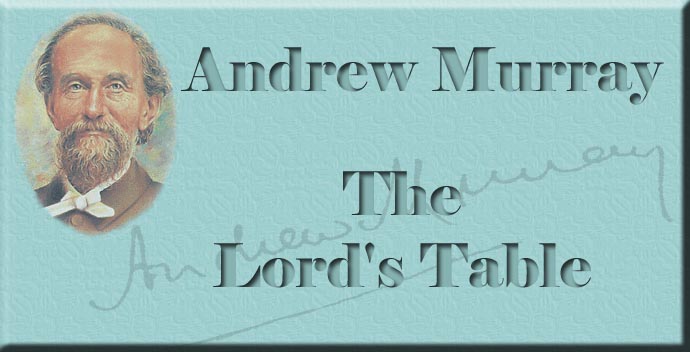
The Lord's Table
By Andrew Murray
Part 2 - Chapter 1
Take Eat
"Take, eat; this is My body which is given for you." –Matthew 26:26; Luke 22:19.
 hen
the Lord says this, He points
out to us that His body is not
so much His as it is ours, since
He received it and suffered it
to be broken on the cross, not
for His own sake, but for ours;
and that He now also desires
that we should look upon it and
appropriate it as our own
possession. Thus, with His body,
He gives Himself to us, and
desires that we should take Him.
The fellowship of the Lord's
Supper is a fellowship of giving
and taking. Blessed giving:
blessed taking. hen
the Lord says this, He points
out to us that His body is not
so much His as it is ours, since
He received it and suffered it
to be broken on the cross, not
for His own sake, but for ours;
and that He now also desires
that we should look upon it and
appropriate it as our own
possession. Thus, with His body,
He gives Himself to us, and
desires that we should take Him.
The fellowship of the Lord's
Supper is a fellowship of giving
and taking. Blessed giving:
blessed taking.Blessed giving: the person gives value to the gift. Who is He that gives? It is my Creator, who comes here to give what my soul needs. It is my Redeemer, who, at the table, will give to me in possession what He has purchased for me. And what gives He? His body and His blood. He gives the greatest and the best He can bestow: yea, all that it is possible for Him to give–the broken body which He first offered to the Father as a sacrifice for sin, a sacrifice that filled Him with joy. And what He offered to the Father, to put away sin before Him, He now offers to me, to put away sin in me. And wherefore gives He this? Because He loves me. He desires to redeem me from death, and to bestow on me eternal life in Himself. He gives Himself to me to be the food, the joy, the living power of my soul. O blessed, Heavenly giving of eternal love! Jesus gives me His own body: Jesus gives me Himself. And not less blessed taking, for it is so simple. Just as I receive with my hand the bread that is intended for me, and hold it before me as my own, so by faith in the word, in which Jesus gives Himself to me, I take Him for myself, and I know that He is really mine. The body in which He suffered for sin is my possession: the power of His atonement is mine. The body of Jesus is my food and my life. And how free is the taking. I think of my unworthiness, only to find in it my claim on Him, the Righteous One, who died for the unrighteous. I think of my misery only as the poverty and the hunger for which the festal repast is prepared, this divine bread so cordially given. What Jesus in His love would give so heartily and willingly, I will as heartily and freely take. And so real is the taking. Where God gives, there is power and life. In giving, there is a communication, a real participation of that which is bestowed. Consequently, my taking does not depend on my strength: I have only to receive what my Saviour brings to me and inwardly imparts. I, a mere worm, take what He, the Almighty, gives. Blessed giving, blessed taking. . Blessed God, may my taking be in conformity with Thy giving; Thy giving, the standard and the measure of my taking. What God gives, I take as a whole. As Thou givest, so I also receive, –heartily, undividedly, lovingly. Precious Saviour, my taking depends wholly on Thy giving. Come Thou and give: give Thyself truly and with power in the communion of the Spirit. Come, my eternal Redeemer, and let Thy love delight itself and be satisfied in me, whilst Thou dost unfold to me the divine secret of the word: My body given for you. Yea, Lord, I wait upon Thee. What thou givest me as my share in Thy broken body, that will I take and eat. And my soul shall go hence, joyful and strengthened, to thank Thee and to serve Thee. Amen.
|
|
 |
 |
|
|
|
Book Navigation
Title Page
Table of Contents
Part I
► The Week before the
Supper
► Sabbath Morning
► Monday Morning
► Tuesday Morning
► Wednesday Morning
► Thursday Morning
► Friday Morning
► Saturday Morning
► Saturday Evening
Part II
► The Communion
Sabbath
► Sabbath Morning
► Take, Eat
► In Remembrance of Me
► My Blood
► The New Covenant
► Unto Remission of
Sins
► For Many
► For You
► One Body
► The Cup of Blessing
► Till He Come
► Sabbath Evening
Part III
► The Week after the
Supper
► Monday Morning
► Tuesday Morning
► Wednesday Morning
► Thursday Morning
► Friday Morning
► Saturday Morning
Appendix
-
Site Navigation
 Home
Home What's New
What's New Bible
Bible Photos
Photos Hiking
Hiking E-Books
E-Books Genealogy
Genealogy Profile
Free Plug-ins You May Need
Profile
Free Plug-ins You May Need
 Get
Java
Get
Java.png) Get Flash
Get Flash Get
7-Zip
Get
7-Zip Get Acrobat Reader
Get Acrobat Reader Get
TheWORD
Get
TheWORD